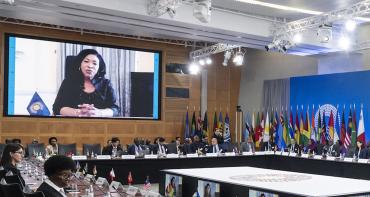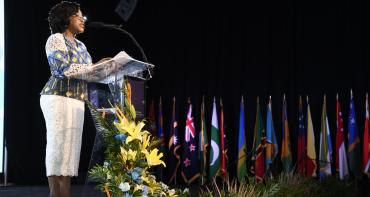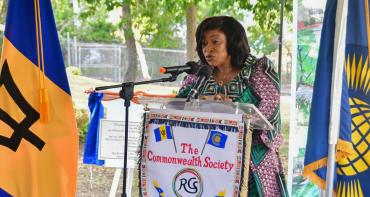The Secretary-General spoke of partnership being in the Commonwealth’s DNA as she delivered a message on multilateralism and peace dialogue at a major thought-leaders’ event.

The Secretary-General spoke of partnership being in the Commonwealth’s DNA as she delivered a message on multilateralism and peace dialogue at a major thought-leaders’ event.
Patricia Scotland was speaking at the 2019 RISING Global Peace Forum, a three-day programme of speeches, seminars and workshops on world peace issues.
Led by the Centre for Trust, Peace and Social Relations at Coventry University in the UK, in partnership with Coventry Cathedral and Coventry City Council, the event brought together peacebuilders, policymakers and academics from around the world to engage in dialogue and exchange ideas for resolving violent conflict and sustaining peaceful societies.
Keynote speakers this year included Australia’s first female Prime Minister Julia Gillard, former Danish PM Helle Thorning-Schmidt and global philanthropist Steve Killelea.
The Commonwealth Secretary-General was speaking as a member of an all-female panel convened by the Academic Council of the United Nations System to discuss the role of multilateralism in peace dialogue. Other panellists were Dr Deborah Seward, director of the UN Regional Information Centre for Western Europe, Josephine Roele, from Gender Action on Peace and Security, and Jo Dobson, associate pro-vice-chancellor at Coventry University.
The Secretary-General described the Commonwealth as a family of 53 nations bound by consensus rather than by treaty.
She said that when its leaders – representing some from the world’s richest and most powerful countries, others from the smallest and most vulnerable nations – sit around a Commonwealth table to talk, they do so as equals.
“When you come to the table you have to come ready to conciliate, ready to listen, ready to accommodate the others,” she said. “What we find as a result is that listening, that dialogue, that understanding, that quest for peace is more easily delivered because this a network you can leave at any time. That means people who are there are there because they wish to be there.”
The Secretary-General said “everything the Commonwealth does is done through partnership” and the organisation’s way of developing peace is “to understand that we are always better together, and that what we do together is always going to be so much stronger than what any of us can do individually.”
During the discussion, the Secretary-General noted that people coming together to set the rules can ensure technology including artificial intelligence can be a force for good.
She said: “AI has been one of the tools we are looking at in terms of digitalisation, so in the Commonwealth last year we looked at a Connectivity Agenda because if we don’t get rules right in terms of how we use that intelligence then there will be those that will be advantaged and those who will be disadvantaged.”
Secretary-General Scotland emphasised that the similarity and interoperability among Commonwealth jurisdictions of many legal, regulatory and professional standards frameworks offered opportunities for the future, as it had historically, for swift agreement and cooperation to adopt inclusive multilateral approaches for the good of all.



